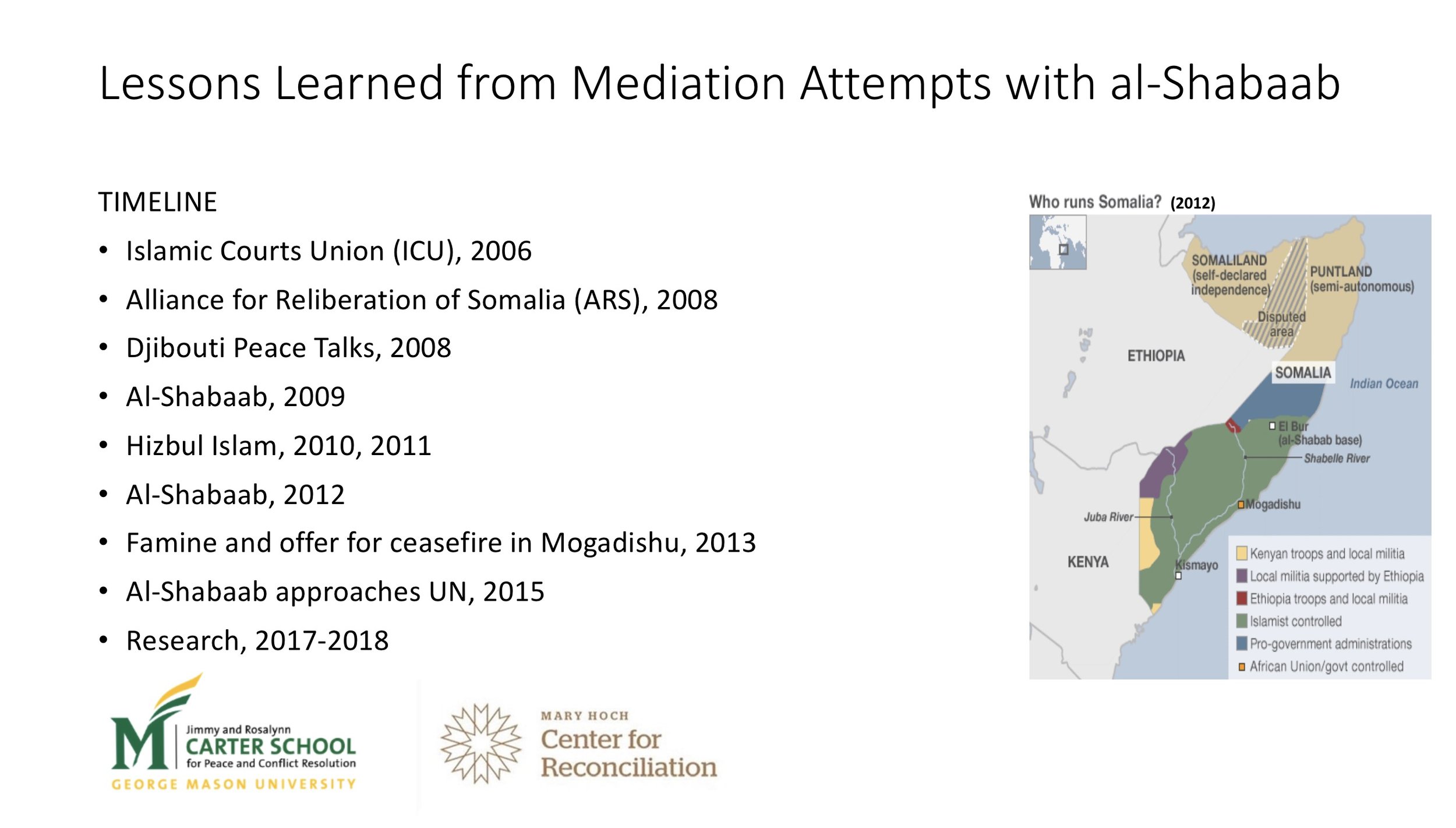By: Amanda Peña
On the morning of May 2, 2023, the Mary Hoch Center for Reconciliation (MHCR) hosted a webinar titled, Negotiating with the Terrorist: Lessons Learned from Mediation Attempts with al-Shabaab. MHCR Director Antti Pentikäinen moderated the event, and the panelists were individuals he had previously worked alongside during high-stakes negotiations in Somalia. Our panelists include Christian Manahal, former Deputy UN Special Representative in Somalia; Abdullahi Farah, who assisted both the UN and the government of Finland in the outreach to al-Shabaab; Patrick Loots, who headed the Disarmament, Demobilization, and Reintegration (DDR) from the United Nations Assistance Mission in Somalia (UNSOM) of al-Shabaab combatants; and Rowda Olad, who reintegrated al-Shabaab through psychotherapeutic approaches.
Pentitkäinen kicked off the event by explaining the importance of sharing these experiences. After the event, Pentikäinen stated:
“During the War on Terror, negotiation attempts with terrorist groups were particularly complicated. It is very hard, or literally impossible; however, to defeat just militarily groups that control large territories or populations, so some kind of outreach and dialogue is necessary. I got personally involved in 2008 for nearly 10 years with negotiation attempts with the Islamist militias in Somalia, including al-Shabaab, and we wanted to share for the first time, publicly, some lessons learned from these efforts to benefit those who still try to end these conflicts.”
Each participant brought unique perspectives to the webinar based on their personal experiences. For example, Manahl made insightfully interesting points regarding his role during the mediation attempts with al-Shabaab. He mentioned that from his perspective, negotiation is done between the parties involved in a conflict, so he redefined his role as a facilitator between al-Shabaab and the UN. He stated that in negotiations, ‘trust is minimal and suspicion is great,” and as a facilitator, that is less of an issue than those directly affected by the conflict. Manahl also pointed out that facilitation does not mean neutrality in his eyes–facilitators can do their work without condoning violence and being indifferent to human rights.
Another panelist, Olad, spoke about her role in reintegrating al-Shabaab members into society using psychotherapeutic approaches. When asked about hopes for the future, Olad responded,
“It is my sincere hope that in conjunction with other advisable approaches, what needs critical attention is seeking the advantages of psychotherapy approaches as the organizing frameworks for changing the behaviors of individual members of terror networks and influencing the socio-cultural roots of membership.”
She stated that individuals recruited by al-Shabaab have marginalized identities and have experienced violence throughout their lives, so joining the terrorist group provides a sense of stability and belonging. Because of this, Olad recommends, “incorporating psychotherapy into [al-Shabaab] engagement efforts, [sic] can achieve more sustainable outcomes that not only address the immediate conditions of violence but can become the basis for prevention.”
This webinar allowed experts to share their experiences with the public on the negotiation process with al-Shabaab. “It is tough in 90 minutes to share such complex and nuanced lessons, but we wanted to honor especially the local actors that often initiate and lead such efforts,” shares Pentikäinen, who is currently writing a book about these experiences.
You can learn more about the conflict in Somalia and the negotiation processes there here.
To watch the webinar in its entirety, click here.

